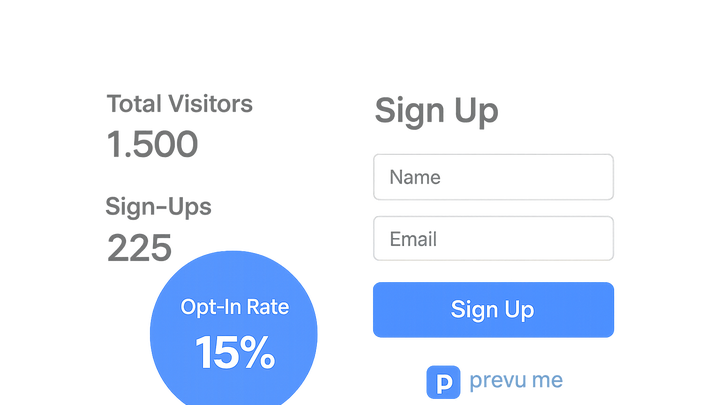Published on 2025-06-29T19:13:50Z
What is Opt-In Rate? Examples and Best Practices
The Opt-In Rate is the percentage of website visitors who complete a subscription form, newsletter signup, or any call-to-action form. In CRO, UX, and SEO, it serves as a critical measure of user engagement, trust, and the perceived value of your offer. A high opt-in rate indicates that your form design, copy, and user flow effectively encourage visitors to share their information. Tools like Prevue.me can analyze form layout, field labels, and accessibility to provide actionable critiques that maximize lead generation. By understanding and optimizing your opt-in rate, you can reduce friction in the conversion funnel, improve lead quality, and ultimately drive more revenue. Regular A/B testing, clear value propositions, and data-driven design tweaks are key to sustained improvements.
Opt-in rate
Percentage of visitors completing a sign-up form; a key CRO metric to track and optimize.
Definition and Importance
This section defines opt-in rate and explains its significance for conversion rate optimization, user experience, and SEO performance.
-
What is opt-in rate?
Opt-In Rate measures how many visitors fill out and submit a form compared to total visitors exposed to it.
- Formula:
Opt-In Rate = (Number of Opt-Ins ÷ Total Visitors) × 100
- Example:
If 1,000 visitors view your newsletter form and 150 subscribe, Opt-In Rate = (150 ÷ 1,000) × 100 = 15%.
- Formula:
How to Calculate Opt-In Rate
Step-by-step guidance on gathering accurate data and computing your opt-in rate.
-
Gather data
Use analytics and event tracking to count unique page visitors and form submissions.
- Visitor tracking:
Implement Google Analytics, prevue.me, or similar tools to record unique page views.
- Form submission tracking:
Use event listeners or data-layer pushes to capture each form submission.
- Html tracking example:
Embed a tracking snippet:
<form id="signup-form" onsubmit="dataLayer.push({'event':'formSubmit','formId':'signup-form'});"> <input type="email" name="email" placeholder="Your email"> <button type="submit">Subscribe</button> </form>
- Visitor tracking:
-
Apply the formula
Divide the total opt-ins by total visitors and multiply by 100 to get the percentage.
-
Segment the data
Break down opt-in rates by device type, traffic source, landing page, or campaign for deeper insights.
Strategies to Improve Opt-In Rate
Proven tactics and real-world examples—leveraging prevue.me—to boost your form conversions.
-
Optimize form design
Reduce friction by simplifying fields and enhancing usability.
- Reduce fields:
Ask only for essential information (e.g., email only) to lower abandonment.
- Use inline validation:
Provide real-time feedback to help users correct mistakes immediately.
- Reduce fields:
-
Enhance value proposition
Clearly state the benefit of signing up and reinforce trust with social proof.
- Benefit-focused copy:
Highlight outcomes like “Get exclusive tips” or “Access free resources.”
- Testimonials:
Include quotes or logos from satisfied subscribers to build credibility.
- Benefit-focused copy:
-
Leverage prevue.me insights
Use prevue.me for targeted UX, accessibility, and SEO critiques on your forms.
- Actionable reports:
Identify layout issues, copy weaknesses, and conversion blockers.
- Accessibility checks:
Ensure forms comply with WCAG standards for an inclusive experience.
- Actionable reports:
Common Pitfalls to Avoid
Frequent mistakes that can undermine your opt-in performance and how to sidestep them.
-
Overwhelming forms
Asking for too much information or using complex layouts deters sign-ups.
-
Weak incentives
Failing to offer a compelling reward or clear benefit reduces motivation.
-
Poor mobile experience
Non-responsive forms, tiny buttons, or long scrolls harm mobile opt-in rates.
